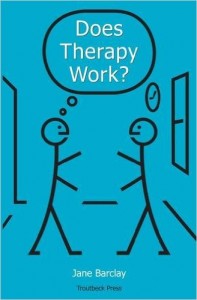‘DOES THERAPY WORK?’
Troutbeck Press, 2011. ISBN 978-0-9567857-0-1
My aim is to demystify the practice of therapy, drawing on my experiences as both therapist and as client.
In Part One, I examine the ‘component parts’ of therapy and how they interact. I go on to consider what might be the source of all struggle and suffering.
In Part Two, I offer as demonstration a narrative of my own story as client in therapy, interweaving insights from my perspective as therapist.
All relationships carry risk. In therapy, the client is, by nature, vulnerable. The debate concerning regulation of practitioners heats up. What measures, if any, can safeguard both parties and promote creative and pioneering practice?
Jane Barclay has written a highly readable, passionate and personal account of the therapy journey, and skilfully applies her learnings to the efficacy and values that inform her own professional stance. Nick Duffell, author of The Making of Them, co-founder of The Centre for Gender Psychology.
Here is therapy in the raw, a description of the therapeutic experience without being a personal memoir, illumating the very human meeting that is therapy. The author has offered something deeply insightful to a broad audience. Mark Harrison, British Association of the Person-Centred Approach (BAPCA).
I am currently on a crowded train on my way into London. Reading your poem, ‘The role of a counsellor’ has reduced me to tears, a look not normally associated with a middle-aged man at 8.45.
Name withheld.
You can see the Introduction to ‘Does Therapy Work?’ below:
Copyright © Jane Barclay, 2011
Available from: admin@troutbeckpress.co.uk
ARTICLES
‘Class – Prejudice & Privilege’ (Self & Society, Vol 30 no 2, June 2002)
‘To Smack or Not to Smack’ (Self & Society, regular column, 2002)
‘Room for Both’ (Self & Society, regular column, 2002)
‘Heroes and Villains’ (Self & Society, regular column, 2002)
‘The Power of Remorse’ (Self & Society, regular column, 2003)
‘Sacrifice’ (Self & Society, Vol 32 no 4, Oct 2004)
‘Addictions – ‘I can’t get no-o… satisfaction’ (Self & Society, Vol 34 no 5, March 2007)
‘Uncrushable’ (Boarding Concern Newsletter, Feb 2009)
‘Endings – to have and to hold’ (Attachment: New Directions in Psychotherapy & Relational Analysis, Karnac Books, March 2010)
‘The Trauma of Boarding at School’ (Boarding Concern website www.boardingconcern.org.uk)
‘The Trauma of Boarding at School’ (Self & Society, Vol 38 no 3, Spring 2011)
‘Gambling – fun, glamorous, seedy, addictive, destructive?’ (Self & Society, March 2012)
‘What does black treacle have in common with riding a Harley-Davidson?’ (Self & Society, Vol 40 no 2, Winter 2013) – a story of integration.
Self & Society, A Forum for Contemporary Psychology, is published by The Association for Humanistic Psychology in Britain (AHPb). All the articles are available from www.ahpb.org.uk
Copyright © Jane Barclay, 2002
All rights reserved
‘DOES THERAPY WORK?’
INTRODUCTION
‘Does therapy work?’
The question was fired at me late one evening at a party by a scientist friend. I started. I had no succinct answer. By the time I’d taken a breath, the conversation had moved on. I awoke the next morning humming with energy to put my own work as therapist under the microscope. First, what did my friend mean by ‘work’? What was this thing called therapy? What exactly happened? How? What was my part?
Twelve years ago, as a student of therapeutic counselling, I became a client in therapy myself. I wrote from the start, both accounts of sessions and the jumble of feelings and thoughts in between. Recognising the value of first-hand experience, I turned my scribbled notes into a case-study of myself to present as part of my diploma. But I didn’t stop there; writing had become my lifeline. I clung to the part of me who was able to remain curious, observing and recording my experiences as I navigated my way through. I’ve drawn deeply from these earlier writings.
For the scornful (‘self-indulgent navel-gazing’) and suspicious (‘exploitative’) I hope my book at least evokes interest. I’ve written of human relationships in terms broader than biological functions and chemical interactions but avoided therapy-speak. I’ve examined and evaluated the work of therapy which stubbornly resists precise measurement. In my endeavour, I’ve discovered both the limitations of language and the border where proof tussles with belief; I’ve allowed space for my own desire for clarity and love of mystery, for my hunger to know and admiration for that which eludes capture, its presence significant yet unnameable. Which makes therapy, in my view, a creative practice, and as such both science and art.
If therapy is to be more widely valued and respected as a response to both acute and chronic distress and offered alongside our mainstream medical model of care, fuller awareness and deeper understanding is vital. I’m hugely grateful to my friend for his question, from which has grown this very considered reply.



